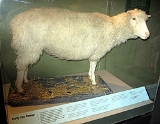
Dolly the Sheep
Overview
Dolly was a female domestic sheep
, and the first mammal
to be cloned
from an adult somatic
cell
, using the process of nuclear transfer
. She was cloned by Ian Wilmut
, Keith Campbell
and colleagues at the Roslin Institute near Edinburgh
in Scotland
. She was born on 5 July 1996 and she lived until the age of six, at which point she died from a progressive lung disease. She has been called "the world's most famous sheep" by sources including BBC News
and Scientific American
.
The cell used as the donor for the cloning of Dolly was taken from a mammary gland
, and the production of a healthy clone therefore proved that a cell taken from a specific part of the body could recreate a whole individual.
Domestic sheep
Sheep are quadrupedal, ruminant mammals typically kept as livestock. Like all ruminants, sheep are members of the order Artiodactyla, the even-toed ungulates. Although the name "sheep" applies to many species in the genus Ovis, in everyday usage it almost always refers to Ovis aries...
, and the first mammal
Mammal
Mammals are members of a class of air-breathing vertebrate animals characterised by the possession of endothermy, hair, three middle ear bones, and mammary glands functional in mothers with young...
to be cloned
Cloning
Cloning in biology is the process of producing similar populations of genetically identical individuals that occurs in nature when organisms such as bacteria, insects or plants reproduce asexually. Cloning in biotechnology refers to processes used to create copies of DNA fragments , cells , or...
from an adult somatic
Somatic cell
A somatic cell is any biological cell forming the body of an organism; that is, in a multicellular organism, any cell other than a gamete, germ cell, gametocyte or undifferentiated stem cell...
cell
Cell (biology)
The cell is the basic structural and functional unit of all known living organisms. It is the smallest unit of life that is classified as a living thing, and is often called the building block of life. The Alberts text discusses how the "cellular building blocks" move to shape developing embryos....
, using the process of nuclear transfer
Nuclear transfer
Nuclear Transfer is a form of cloning. The steps involve removing the DNA from an oocyte , and injecting the nucleus which contains the DNA to be cloned. In rare instances, the newly constructed cell will divide normally, replicating the new DNA while remaining in a pluripotent state...
. She was cloned by Ian Wilmut
Ian Wilmut
Sir Ian Wilmut, OBE FRS FMedSci FRSE is an English embryologist and is currently Director of the Medical Research Council Centre for Regenerative Medicine at the University of Edinburgh. He is best known as the leader of the research group that in 1996 first cloned a mammal from an adult somatic...
, Keith Campbell
Keith Campbell (biologist)
Keith H. S. Campbell is an English biologist who was a member of the team that in 1996 first cloned a mammal, a Finnish Dorset lamb named Dolly, from fully differentiated adult mammary cells....
and colleagues at the Roslin Institute near Edinburgh
Edinburgh
Edinburgh is the capital city of Scotland, the second largest city in Scotland, and the eighth most populous in the United Kingdom. The City of Edinburgh Council governs one of Scotland's 32 local government council areas. The council area includes urban Edinburgh and a rural area...
in Scotland
Scotland
Scotland is a country that is part of the United Kingdom. Occupying the northern third of the island of Great Britain, it shares a border with England to the south and is bounded by the North Sea to the east, the Atlantic Ocean to the north and west, and the North Channel and Irish Sea to the...
. She was born on 5 July 1996 and she lived until the age of six, at which point she died from a progressive lung disease. She has been called "the world's most famous sheep" by sources including BBC News
BBC News
BBC News is the department of the British Broadcasting Corporation responsible for the gathering and broadcasting of news and current affairs. The department is the world's largest broadcast news organisation and generates about 120 hours of radio and television output each day, as well as online...
and Scientific American
Scientific American
Scientific American is a popular science magazine. It is notable for its long history of presenting science monthly to an educated but not necessarily scientific public, through its careful attention to the clarity of its text as well as the quality of its specially commissioned color graphics...
.
The cell used as the donor for the cloning of Dolly was taken from a mammary gland
Mammary gland
A mammary gland is an organ in mammals that produces milk to feed young offspring. Mammals get their name from the word "mammary". In ruminants such as cows, goats, and deer, the mammary glands are contained in their udders...
, and the production of a healthy clone therefore proved that a cell taken from a specific part of the body could recreate a whole individual.
Unanswered Questions

